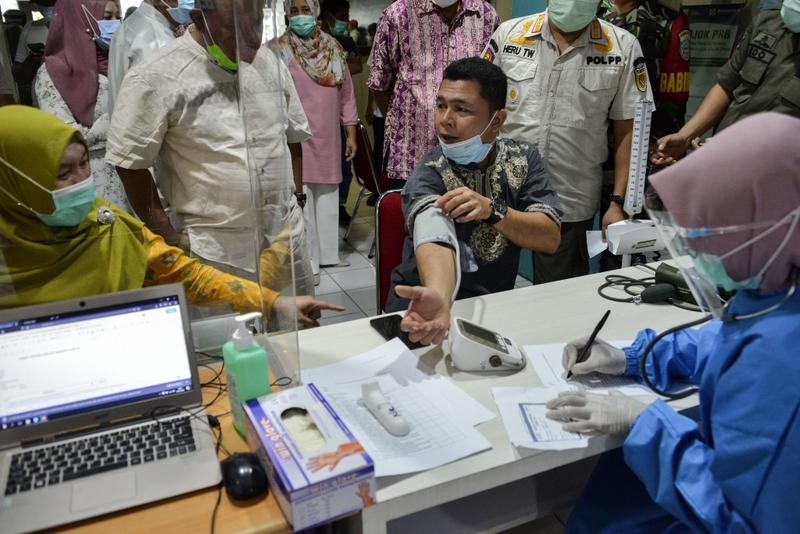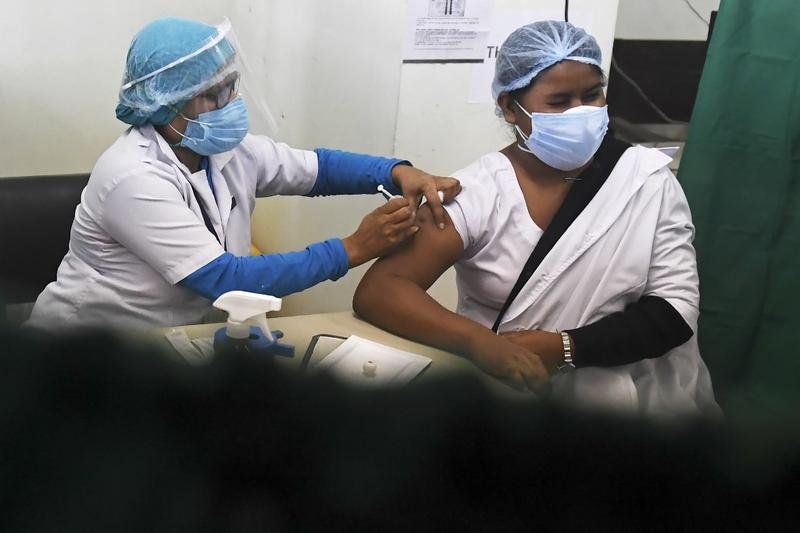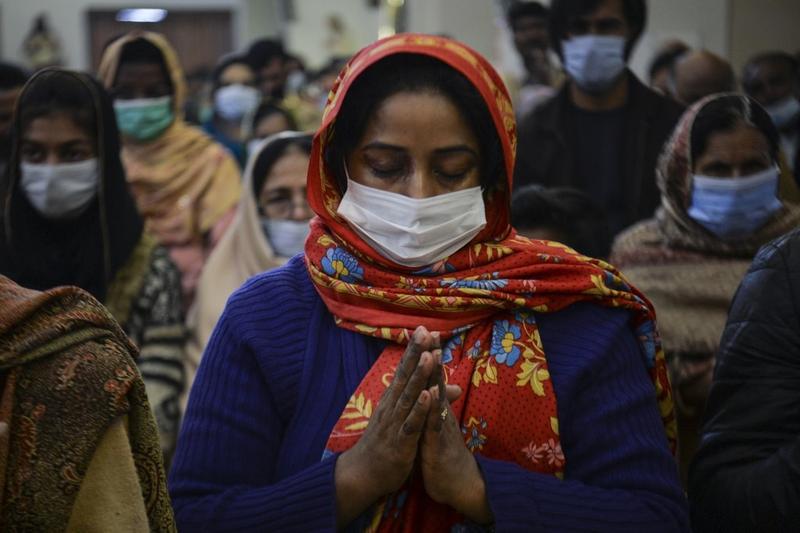 An official has a blood pressure test before receiving the Sinovac vaccine against the COVID-19 coronavirus at Meuraxa Hospital in Banda Aceh on Jan 15, 2021. (CHAIDEER MAHYUDDIN / AFP)
An official has a blood pressure test before receiving the Sinovac vaccine against the COVID-19 coronavirus at Meuraxa Hospital in Banda Aceh on Jan 15, 2021. (CHAIDEER MAHYUDDIN / AFP)
PHNOM PENH / SUVA / SINGAPORE / NEW DELHI / ULAN BATOR / TEHRAN / BAGHDAD / JERUSALEM / AMMAN / BEIRUT / KATHMANDU / WELLINGTON / ISLAMABAD / JAKARTA / SEOUL / MANILA - The vaccination program constitutes a game changer to control the COVID-19 pandemic and a key to recover the economy which has slumped down due to the coronavirus, Indonesian President Joko Widodo has said.
"Controlling a pandemic, especially through vaccination is a game changer," the president said, adding that it is a very decisive key to make people resume works and return to worships solemnly, while "our children would go back to schools normally, and the national economy would revive soon."
The head of state made the remarks at a virtual annual meeting of the 2021 financial service industry in Jakarta on Friday.
He called on all parties to be optimistic in 2021 which would be a turning point of the COVID-19 pandemic issue which started in early 2020.
The vaccination program was launched Wednesday with the president receiving the first shot of COVID-19 vaccine, and will continue until it creates a herd immunity.
Meanwhile, Industry Minister Agus Gumiwang Kartasasmita was upbeat that Indonesia's economic growth would be in the range between 4.5 percent and 5.5 percent this year.
The number of Indonesians overseas who were confirmed positive for COVID-19 rose to 2,816, with three new cases registered, the Foreign Ministry said on Sunday.
Of the three new cases, two were reported in Britain and one in Kuwait.
The ministry also reported that six more Indonesians abroad have recovered from COVID-19, and all the six were found in Egypt, bringing the total recoveries to 1,974, or 70 percent of the accumulated cases.
Meanwhile, 673 Indonesians in other countries are still under medical treatment and the death toll remains at 169.
ALSO READ: World hits 2 million COVID-19 deaths with cases still surging
Australia
Australia’s medical regulator will seek information from Pfizer Inc and health authorities in Norway after the Nordic nation expressed concern about the safety of the firm’s vaccine for elderly people with serious underlying health conditions.
Australia’s foreign ministry will also contact Norway’s government to discuss the issue, Health Minister Greg Hunt told reporters Sunday in Melbourne. Australia has an agreement for 10 million doses of the Pfizer/BioNTech vaccine, alongside three deals with other providers.
Norway has expressed concern after it raised an estimate of the number of elderly people who died after receiving inoculations to 29. Pfizer and BioNTech are working with the Norwegian regulator to investigate the deaths.
Cambodia
Cambodia on Sunday reported three more imported COVID-19 cases, bringing the total number of infections in the kingdom to 439 so far, said a Health Ministry (MoH) statement.
The new cases were detected on Cambodian migrant workers returning from Thailand on Jan. 12, 13, and 15 via land borders, the statement said.
Fiji
Fiji reported two more imported COVID-19 cases on Sunday, bringing the total tally to 55 in the island nation.
According to a statement by Fiji's health ministry on Sunday, one patient is a 49-year-old female and the other is a 58-year-old female, and both of them arrived in Fiji on a flight from New Zealand on Dec. 24 last year.
India
India's COVID-19 tally rose to 10,557,985 on Sunday, as 15,144 new cases were registered during the past 24 hours, according to the data from the federal health ministry.
According to the official data, the death toll mounted to 152,274 with 181 new deaths.
There are still 208,826 active cases in the country, while 10,196,885 people have been discharged so far from hospitals after medical treatment.
Meanwhile, the federal government has ramped up COVID-19 testing facilities, as over 180 million tests have been conducted so far.
India's western state of Maharashtra said it has suspended its COVID-19 vaccination drive till Monday due to a technical glitch in the app that led to lower turnout on the first day of the initiative on Saturday.
 A medical worker inoculates a colleague with a COVID-19 coronavirus vaccine at the Nil Ratan Sircar Medical College and Hospital in Kolkata on Jan 16, 2021. (DIBYANGSHU SARKAR / AFP)
A medical worker inoculates a colleague with a COVID-19 coronavirus vaccine at the Nil Ratan Sircar Medical College and Hospital in Kolkata on Jan 16, 2021. (DIBYANGSHU SARKAR / AFP)
Iran
Iranian President Hassan Rouhani Saturday said the Iranian government will spare no efforts to start vaccination by the end of the current Iranian calendar year (March 20, 2021).
Addressing a national committee meeting on fighting COVID-19, Rouhani urged people to observe all necessary health protocols, saying if health protocols are not implemented, the country may run the risk of another peak in COVID-19 cases, official news agency IRNA reported.
Rouhani said that Iran's joint vaccine with a foreign country will be ready next Iranian year, vowing to provide other vaccines bought from COVAX by the end of the current year or at the beginning of the next year.
There are other home-made vaccines and permissions for human trial have been issued for several of them.
Iraq
The Iraqi Ministry of Health reported on Saturday 596 new COVID-19 cases, bringing the total nationwide infections to 607,587.
The ministry also reported three new deaths, the lowest since late May 2020, raising the death toll from the infectious virus to 12,935, and 2,009 more recovered cases, bringing the total recoveries to 567,898.
Israel
Israel's Ministry of Health reported 6,815 new COVID-19 cases on Saturday, bringing the total number in the country to 541,864.
The death toll from COVID-19 in Israel reached 3,943 with 33 new fatalities, while the number of patients in serious condition decreased from 1,135 to 1,082, out of 1,897 hospitalized patients.
Jordan
Jordan on Saturday reported 16 new COVID-19 deaths and 706 new cases, taking the death toll to 4,137 and the total infections to 313,55.
Meanwhile, Minister of State for Media Affairs Ali Ayed said movement restrictions would be reimposed in case of no commitment to health and safety measures against COVID-19.
The minister said the government might cancel the gradual easing of the coronavirus containment measures, adding that several violations were reported on Friday.
Lebanon
Lebanon registered on Saturday 5,872 new COVID-19 infections, bringing the total number of cases in the country to 249,158.
Meanwhile, the death toll from the virus went up by 41 to 1,866.
Lebanon has started a total lockdown period until Jan. 25, which is expected to be renewed for an additional week in an attempt to curb the COVID-19.
Mongolia
Mongolia reported five new COVID-19 cases in the last 24 hours, taking its nationwide tally to 1,517, the country's National Center for Communicable Diseases said Sunday.
The latest confirmed cases were locally transmitted or detected in the country's capital city Ulan Bator, the center said in a statement.
Meanwhile, 38 more patients have recovered from the disease, raising the total to 947, it added.
Nepal
Nepal's drug regulator has granted approval to the COVID-19 vaccine developed by the University of Oxford and pharmaceutical giant AstraZeneca for emergency use in Nepal.
It is the first COVID-19 vaccine approved by Nepal's drug regulator, the Department of Drug Administration. The department said in a notice on Friday that the AstraZeneca vaccine was approved for emergency use in Nepal.
New Zealand
New Zealand reported 10 cases of COVID-19 in managed isolation in two days, said the Ministry of Health in a statement on Sunday.
Of the new cases identified since the last media statement on Friday, one case was classified as historical and deemed not infectious, said the statement.
There was no new case in the community, said the ministry.
The total number of active cases in New Zealand was now 82, and the total number of confirmed cases reached 1,900 in the country, according to the ministry.
READ MORE: Virus: Pfizer temporarily reduces vaccine deliveries to Europe
 Christian devotees attend a prayer service for the victims of the COVID-19 coronavirus ahead of the upcoming Christmas celebrations, at the St. Joseph's Catholic Cathedral in Rawalpindi on Dec 20, 2020. (FAROOQ NAEEM / AFP)
Christian devotees attend a prayer service for the victims of the COVID-19 coronavirus ahead of the upcoming Christmas celebrations, at the St. Joseph's Catholic Cathedral in Rawalpindi on Dec 20, 2020. (FAROOQ NAEEM / AFP)
Pakistan
AstraZeneca’s COVID-19 vaccine has been approved for emergency use in Pakistan, the health minister said on Saturday, making it the first coronavirus vaccine to get the green light for use in the South Asian country.
Pakistan, which is seeing rising numbers of coronavirus infections, said its vaccines would be procured from multiple sources.
“DRAP granted emergency use authorisation to AstraZeneca’s COVID vaccine,” the health minister, Faisal Sultan, told Reuters.
Approval has been given to get more than a million doses of Sinopharm’s vaccine from China, he said.
“We are in the process to obtain Western origin and other vaccines both via bilateral purchase agreements as well as via the COVAX facility,” he said.
Pakistan is speaking to a number of vaccine makers, and Sultan said the country could get “in the range of tens of millions” of vaccine doses under an agreement with China’s CanSinoBio.
 Singapore Airlines crew member walk along the transit hall of Changi International Airport terminal in Singapore on Jan 14, 2021. (ROSLAN RAHMAN / AFP)
Singapore Airlines crew member walk along the transit hall of Changi International Airport terminal in Singapore on Jan 14, 2021. (ROSLAN RAHMAN / AFP)
Singapore
Singapore will require all inbound travelers to take a Covid test upon arrival in the city-state from Jan. 25 amid a resurgence of cases globally, the Ministry of Health said in a statement.
Citizens and permanent residents of Singapore who return from either the United Kingdom or South Africa will also be subject to an additional seven-day self-isolation at their place of residence following their 14-day stay at a dedicated facility, according to the statement. The UK and South Africa have both reported new strains of the virus that appear to be easier to transmit.
At present, Singapore only requires travelers who are not citizens or permanent residents, and who have recent travel history to high-risk countries or regions, to take a PCR test 72 hours before departure.
From Feb 1, visitors applying to enter Singapore under the reciprocal green lane and air travel pass arrangements will need to have insurance for virus medical treatment and hospitalization costs with a minimum coverage of S$30,000 (US$22,560).
Singapore's Ministry of Health (MOH) reported 24 new confirmed cases of COVID-19 on Saturday, bringing the country's total tally to 59,083.
Of the new cases, 19 are imported, four are in the community, and one is linked with the dormitories of foreign workers.
South Korea
South Korea reported 520 more cases of COVID-19 as of midnight Sunday compared to 24 hours ago, raising the total number of infections to 72,340.
The daily caseload stayed below 600 for seven straight days, after recording 451 on Monday.
The daily number of infections hovered above 100 since Nov 8 owing to small cluster infections in Seoul and its surrounding Gyeonggi province as well as imported cases.
Of the new cases, 142 were Seoul residents and 173 were people residing in Gyeonggi province.
Twenty were imported from overseas, lifting the combined figure to 5,922.
Thirteen more deaths were confirmed, leaving the death toll at 1,249. The total fatality rate stood at 1.73 percent.
The Philippines
The Department of Health (DOH) of the Philippines on Sunday reported 1,895 new confirmed coronavirus disease (COVID-19) cases, bringing the total number in the country to 500,577.
The death toll climbed to 9,895 after 11 more patients died from the viral disease, the DOH said. It added 5,868 more patients recovered, raising the total number of recoveries to 465,991.
The Philippines, which has about 110 million population, has tested over 6.84 million people since the disease emerged in January last year.


